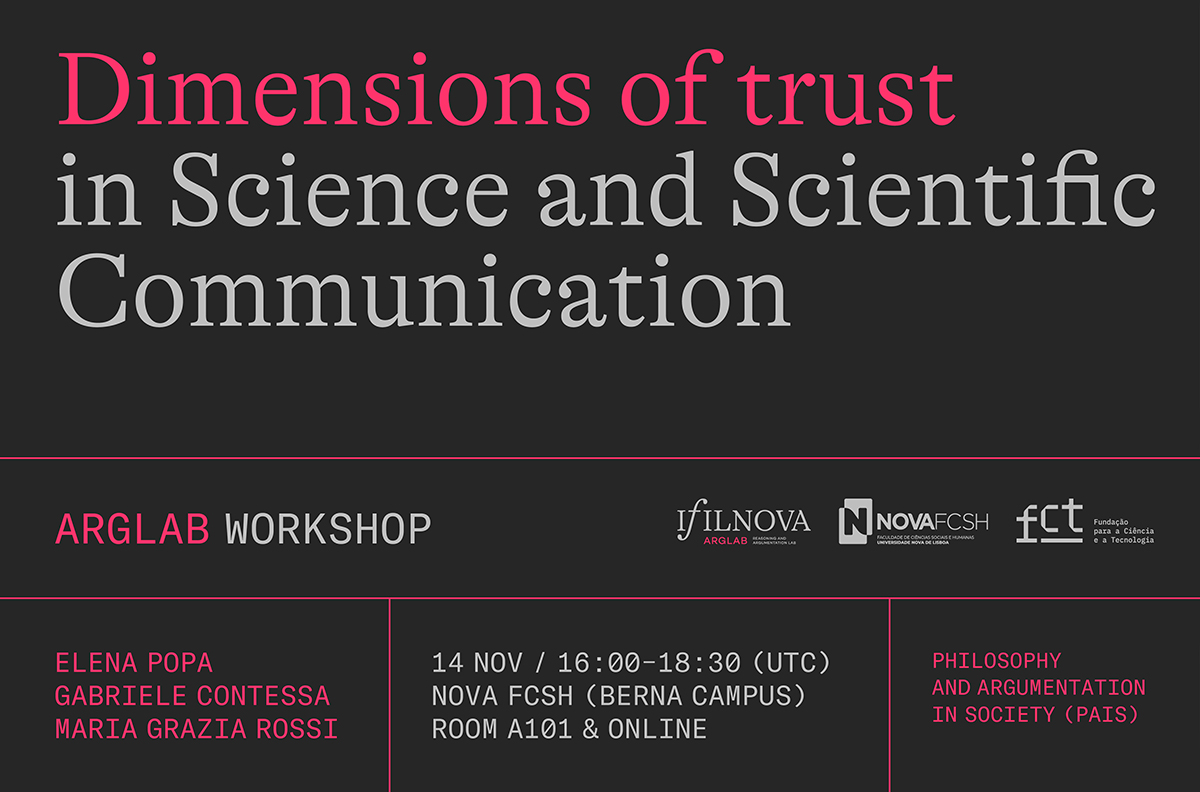Dimensions of trust in Science and Scientific Communication

Trust is a central condition for the production and circulation of scientific knowledge, yet it is constantly tested by uncertainty, inequality, and communicative failures. Moments of crisis and controversy expose the fragility of trust and its deep link to discourse and interaction, as some forms of communication and interaction at interpersonal as well as institutional level yield higher levels of trust than others. This workshop adopts an interdisciplinary lens—connecting philosophy of science, epistemology, and argumentation among other perspectives—to explore how trust operates across institutional, epistemic, and dialogical levels, and how it can be sustained within complex communicative environments.
To join the session on Teams, please get in touch with Maria Grazia Rossi at mgrazia.rossi@fcsh.unl.pt for the details.
Programme
Chair: Cristina Ganz (Vita-Salute San Raffaele University)
Welcome and Introduction
16:00–16:40 | Epistemic trust injustice in public health and how to ameliorate it
Elena Popa (University of Seville)
16:40–17:20 | Argumentative Participation and Discursive Trust at the Interface of Public Health and Clinical Dialogue
Maria Grazia Rossi (NOVA University Lisbon)
17:20–18:00 | Vaccine Hesitancy: A Post-Trust Diagnosis
Gabriele Contessa (Carleton University)
18:00 Joint discussion and closing remarks
Abstracts
ELENA POPA (University of Seville)
Epistemic trust injustice in public health and how to ameliorate it
Trust plays a key role in public health. The success of guidelines and recommendations requires a trusting relation between the scientists making claims about the efficiency of interventions, policymakers, practitioners, and members of the public. This makes warranted distrust especially among groups that have suffered oppression but also more broadly in contexts where the relevant institutions involved are not sufficiently trustworthy a problem. The term ‘epistemic trust injustice’ thus refers to cases where the conditions that ground public trust in experts, or enable public access to scientific knowledge, are not met, especially for members of oppressed groups. This can bring about additional harm, as it can limit access to needed health services or relevant medical knowledge. In this paper, I will explore several amelioration strategies, starting from increased attention to population-level approaches in public health, which are more likely to target the needs of marginalized groups, structural competence among healthcare professionals, and participation from the relevant stakeholders.
MARIA GRAZIA ROSSI (NOVA University Lisbon)
Argumentative Participation and Discursive Trust at the Interface of Public Health and Clinical Dialogue
This contribution explores how argumentative participation can foster discursive trust in contexts of medical scepticism and institutional uncertainty. Situated within Community-Centred Approaches (CCA) and participatory models of public health, it conceptualises clinical dialogue as the core community where interpersonal and institutional trust converge and are discursively negotiated. Within this space, doubt plays a pivotal role: it becomes a site of interaction where communicative and interpretive expertise are essential. Through a case-study discussion on vaccine hesitancy, the analysis examines how clinicians’ engagement with patients’ expressions of doubt can foster, sustain, or erode trust. Such expressions may activate different argumentative potentials—ambivalent, sceptical, or denialist—each shaping discursive trajectories that either strengthen or undermine trust. From this perspective, argumentative participation functions as a hinge between the dynamics of clinical dialogue and the broader arena of public health controversy, showing how the cultivation of discursive trust in local encounters can sustain wider processes of participatory repair.
GABRIELE CONTESSA (Carleton University)
Vaccine Hesitancy: A Post-Trust Diagnosis
Liberal democracies seem to be in a state of epistemic malaise, whose (alleged) symptoms include the spread of conspiracy theories, the proliferation of fake news, and the rise of science skepticism. One of the standard diagnoses of this malaise is the post-truth diagnosis, which ascribes the malaise to the fact that many citizens of liberal democracies have little or no interest in the truth and would rather believe what suits their social identity, religious convictions, or political ideology. In this talk, I argue that the post-truth diagnosis seems highly unlikely in one of the key examples of science skepticism—vaccine hesitancy. I suggest an alternative diagnosis—the post-trust diagnosis, which claims that the malaise arises from the fact that many communities have developed a not-entirely-unwarranted mistrust in some of the institutions that form the backbone of the epistemic infrastructure of liberal democracies, which, beside science, include government and the media.

